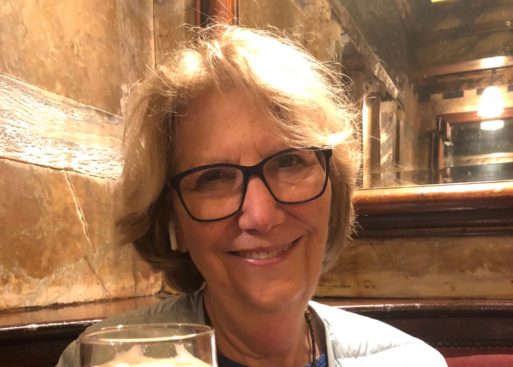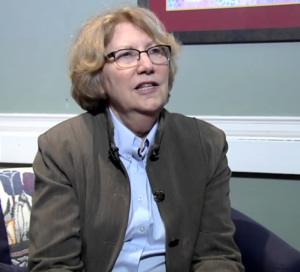
Dr. M. Katherine Shear is an internist and psychiatrist widely recognized for her work in bereavement studies. She has developed a targeted psychotherapy, Complicated Grief Treatment, for people unable to move forward after a loss, which has proved to be efficacious in three different trials. She is the founding director of the Center for Complicated Grief.
Editor’s note: This interview has been edited for length and clarity.
Melissa Gouty: Thank you, again, Dr. Shear for talking to us about complicated grief. In this second part of our interview, I hope you will discuss the treatment you developed specifically for complicated grief. You said it’s a very different protocol from depression treatment.
Dr. Katherine Shear: First, let me tell you some of the basics about the treatment, and then I’ll give you more of the details. The first basic is that Complicated Grief treatment is not about grief. It’s about adapting to loss.
There are these two basic principles.
One is that we help people adapt to their loss. We don’t try to change their grief. We believe that grief is the form that love takes when someone we love dies. It’s painful, and certainly very difficult. And if it remains and is pervasive, then it becomes complicated grief. But having grief in our lives is not problematic. One of the things that we really need to do is to understand that. So we don’t try to lower grief or directly address grief. We address adapting to the loss.
The second basic principle is that while this treatment is structured and sequenced and there are some very some specific things we do, it is also administered in a way that is personalized for every client we treat. It’s not a robotic or cook-booky kind of approach. We personalize it.
Basically, this is a treatment that is focused on helping people adapt to loss.
Melissa: And what does that entail?
Dr. Shear: We have to accept the permanence of the loss, its finality, and also the changes that a loss brings. That’s one of the things that makes loss so hard. But losing someone we love brings about so many other changes. Changes within ourselves, and changes in the world around us. But we can adapt.
That’s the good news. Living things adapt to change. We do expect people to do that naturally, but what they have to do naturally is to accept the reality of the loss. That loss means a change in the relationship with the person who died. So we don’t lose our relationship, really, because much of our relationship with our loved ones actually exists within us already.
That’s the way our minds work. We’re biologically built to take in this information and hold onto it, and it doesn’t go away just because the person dies. We don’t stop loving someone when they die, and we don’t stop having a relationship with them either because those relationships go on internally. But the relationship changes dramatically. What we have to accept is that change and to adapt to a very new kind of relationship with the person who died.

Article on the work of Dr. M. Katherine Shear
won the National Association of Social Workers
Media Prize in 2014
Credit: social work.columbia.edu
Maybe you lose a romantic partner or spouse. Maybe they were the person who always mowed the lawn or cooked the food, and you have to learn to do that. So that’s a change in your role, a change in your skill set. There are a myriad of things like that come with a loss, and we have to accept those. That’s part of adapting,
The other part of adapting is restoring our own sense of well-being. Because when someone first dies, we often feel undermined, sad and very, very emotional. Our thoughts and a lot of what we do are centered around the person and what we do to remember them. We do things to feel close to them. We do things to honor them. Especially in the beginning.
In the beginning, our lives are dominated by grief. But over time, we need to restore our own well-being and the promise and possibility of the future — finding joy and satisfaction and happiness in the world in which our loved one is absent.
Right after someone dies, some of the things we think, feel, and do are a kind of support adaptation. Other things that we think, feel, or do can get in the way. In particular, one of those things is the strong desire to redo the death event. In other words, to rewrite it so that it doesn’t happen…You know, if only such and such had happened and the person had not died. I think everyone thinks that at least once, right?
Melissa: Right.
Dr. Shear: If that kind of thinking gets a foothold … if it gets very frequent and insistent in a person’s mind, that can interfere in a person’s process of accepting the finality of the loss.
Melissa: I see.
Dr. Shear: Those are the kinds of things that we look for and try to help people with. Those parts of the early grief response that get a foothold and then are impediments to adaptation are what we try to resolve.

Dr. Shear discussing what complicated grief is on
YouTube.com
Credit: YouTube Center for Complicated Grief
Melissa: Were you the one who pioneered this Complicated Grief Treatment that is so different from treatment for depression?
Dr. Shear: Yes, but I didn’t do it alone. I work in teams. A lot of this has developed in discussion with other people, with other therapists, with colleagues at the University of Pittsburgh, and elsewhere. I don’t want to say this is just mine.
Melissa: How do you get the treatment protocol that you’ve developed with your team out to the practicing clinicians?
Dr. Shear: We publish a lot. Our group together has published over 100 articles in the professional literature. However, it turns out that that’s not a very good way to disseminate information because there are too many journals.
But there are other ways. I am publishing a book. We do workshops. We have information on our website that people can access. We run monthly webinars that are free of charge. We’ve also developed two mobile apps. One is called Grief Steps, and the other one is called Grief Steps for Parents. This particular app has a lot of the principles and suggested action steps that we discuss in Complicated Grief Therapy for parents. It also includes information about parenting when you’re bereaved, and some information about what children experience.
Melissa: What’s the address of your website where people can get this literature?
Dr. Shear: It’s ComplicatedGrief.org.
Melissa: What’s the most difficult thing about working in this field?
Dr. Shear: I would say that the single most difficult thing is that there are people working in the field who are very negative about the idea of any new protocol, and they worry that we are pathologizing or medicalizing grief. And that is really so far from the way that anyone I work with thinks about grief or the way that we work with people. It is unfortunate that there’s some resistance to Complicated Grief Treatment because there are people who can be helped, and they can be helped very quickly.
I agree that we should not pathologize grief. But it is hard to have people who are in the helping professions so negative about something we know can help.
Melissa: Dr. Shear, I appreciate your time and insight. I’m sure our discussion will be helpful to people who are grieving and for those dealing with complicated grief.
Dr. Shear: It’s been my pleasure. Thank you for sharing this information.
If you missed Part One of our discussion with Dr. Katherine Shear, please check back here.

 What is the Treatment for Complicated Grief?
What is the Treatment for Complicated Grief?


 John Mulaney’s “Funeral Planning” on Netflix: No Real Plan
John Mulaney’s “Funeral Planning” on Netflix: No Real Plan

 Composting Bodies Is Now Legal in a Dozen States
Composting Bodies Is Now Legal in a Dozen States














